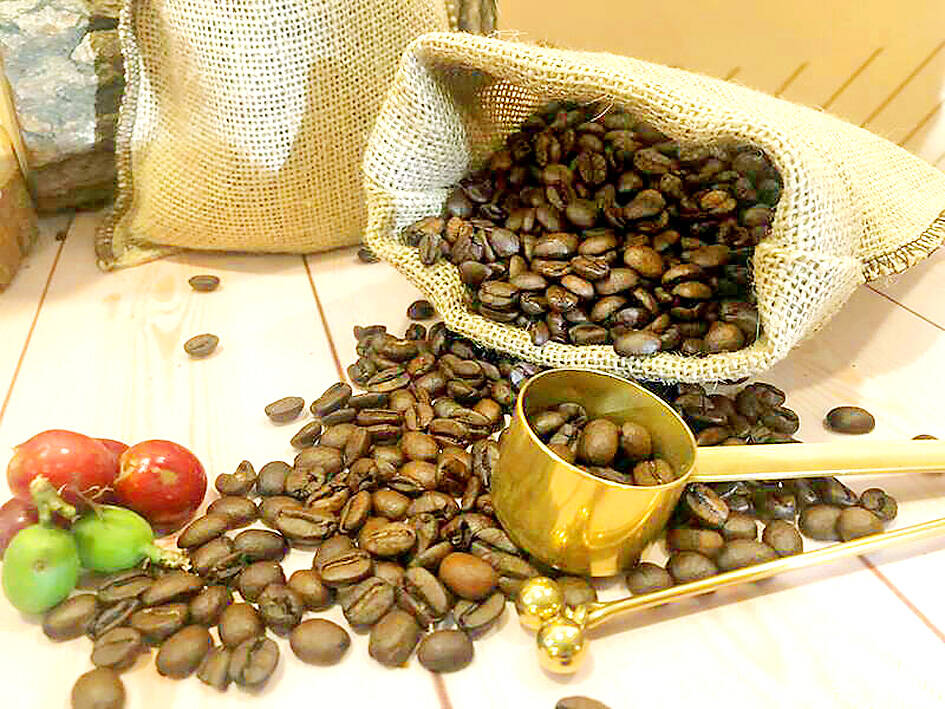Taiwan ranks third in coffee consumption per capita in Asia, the latest Ministry of Agriculture data showed.
Taiwanese consume 1.77kg, or 177 cups of coffee, per person each year, less only than Japan and South Korea, at 600 cups and 400 cups respectively, the ministry’s Tea and Beverage Research Station said.
Although the nation mainly relies on imported coffee, there has been an increase in home-grown coffee bean production, the ministry said.

Photo: Yang Yuan-ting, Taipei Times
Cuttings and other techniques are commonly used to ensure domestic beans have stronger floral and fruity flavors, it said.
It is a fast-expanding market with Taiwan’s coffee consumption growing with a rate of more than 20 percent per year over the past five years, the ministry said.
Some Taiwanese beans have won top prizes at international competitions recently and domestic beans are often auctioned at high prices, it said.
“Taiwanese coffee producers mainly grow arabica beans, as it is believed to be self-pollinating and more productive, but our studies showed that arabica beans have a higher rate of cross-pollination,” research station director Su Tsung-chen (蘇宗振) said on Thursday.
“In this case, coffee beans have more genetic variations,” Su said. “It changes the original plant and makes it difficult to ensure consistency in quality and flavor.”
The station uses an asexual reproduction technique to maintain consistency in coffee beans, he said, adding that it can help preserve the purity of plants, and maintain quality and flavor.
Applied together with cuttings, the technique helps rapid growth and reproduction needed to boost acreage of coffee plants, he said.
“We also have developed a suitable medium for reproducing coffee plants through cuttings and other key techniques to determine the degree of maturity for the beans,” he said.
“These have enabled seedling producers and farmers to rapidly grow beans imbued with specialty flavors,” he said. “Therefore, we expect an increase in the quality and competitiveness of Taiwanese coffee beans in coming years, as we have passed on these methods to producers.”

The Grand Hotel Taipei on Saturday confirmed that its information system had been illegally accessed and expressed its deepest apologies for the concern it has caused its customers, adding that the issue is being investigated by the Ministry of Justice Investigation Bureau. The hotel said that on Tuesday last week, it had discovered an external illegal intrusion into its information system. An initial digital forensic investigation confirmed that parts of the system had been accessed, it said, adding that the possibility that some customer data were stolen and leaked could not be ruled out. The actual scope and content of the affected data

‘LIKE-MINDED PARTNER’: Tako van Popta said it would be inappropriate to delay signing the deal with Taiwan because of China, adding he would promote the issue Canadian senators have stressed Taiwan’s importance for international trade and expressed enthusiasm for ensuring the Taiwan-Canada trade cooperation framework agreement is implemented this year. Representative to Canada Harry Tseng (曾厚仁) in an interview with the Central News Agency (CNA) said he was increasingly uneasy about Ottawa’s delays in signing the agreement, especially as Ottawa has warmed toward Beijing. There are “no negotiations left. Not only [is it] initialed, we have three versions of the text ready: English, French and Mandarin,” Tseng said. “That tells you how close we are to the final signature.” Tseng said that he hoped Canadian Prime Minister Mark Carney

President William Lai (賴清德) yesterday bestowed one of Taiwan’s highest honors on Saint Vincent and the Grenadines (SVG) Ambassador Andrea Clare Bowman in recognition of her contributions to bilateral ties. “By conferring the Order of Brilliant Star with Grand Cordon on Ambassador Bowman today, I want to sincerely thank her, on behalf of the Taiwanese people, for her outstanding contribution to deepening diplomatic ties between Taiwan and SVG,” Lai said at a ceremony held at the Presidential Office in Taipei. He noted that Bowman became SVG’s first ambassador to Taiwan in 2019 and

POSITIVE DEVELOPMENT: Japan and the US are expected to hold in-depth discussions on Taiwan-related issues during the meeting next month, Japanese sources said The holding of a Japan-US leaders’ meeting ahead of US President Donald Trump’s visit to China is positive news for Taiwan, former Japan-Taiwan Exchange Association representative Hiroyasu Izumi said yesterday. After the Liberal Democratic Party’s landslide victory in Japan’s House of Representatives election, Japanese Prime Minister Sanae Takaichi is scheduled to visit the US next month, where she is to meet with Trump ahead of the US president’s planned visit to China from March 31 to April 2 for a meeting with Chinese President Xi Jinping (習近平). Japan and the US are expected to hold in-depth discussions on Taiwan-related issues during the